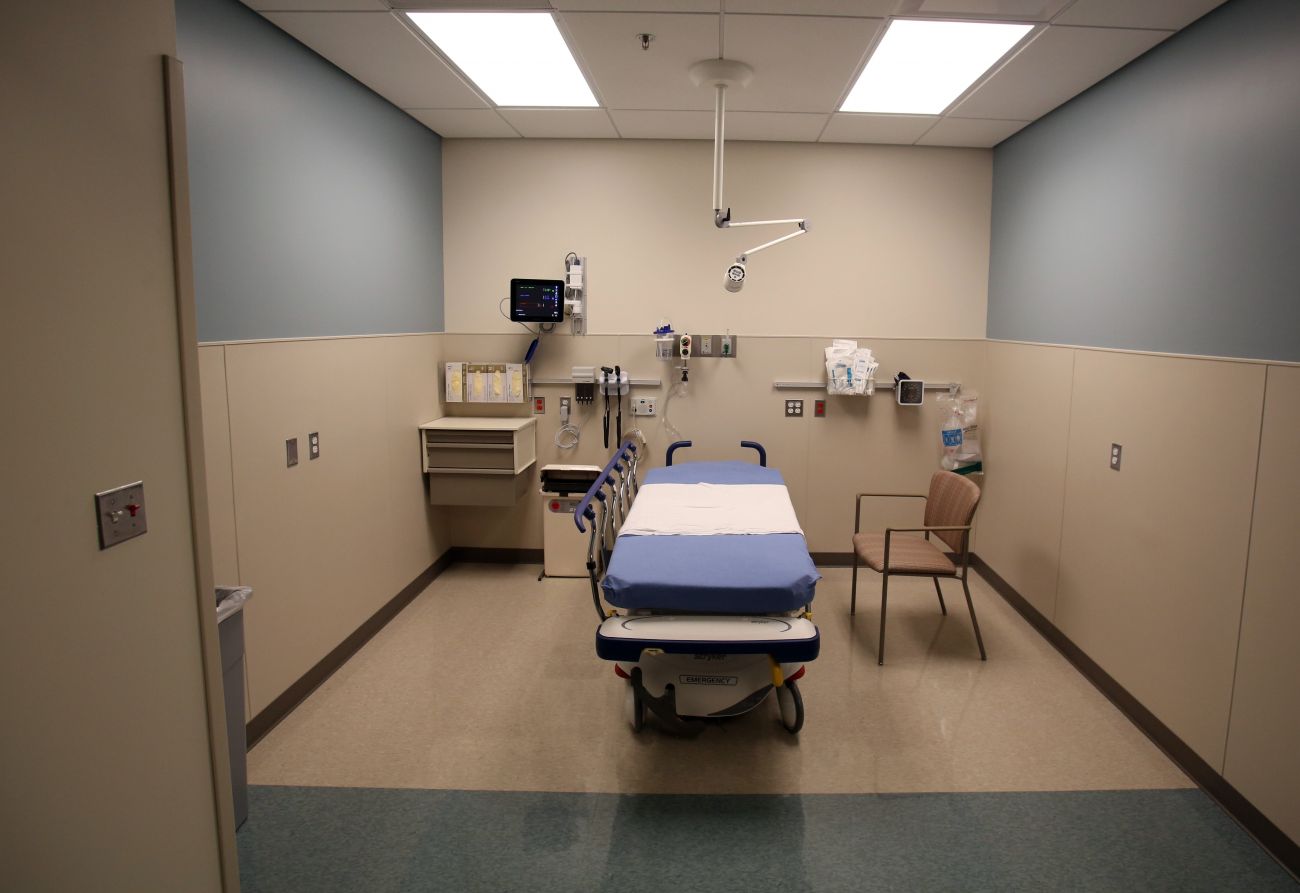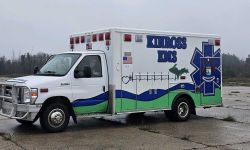ER visits plummet amid pandemic: 'More people are dying at home'

When COVID-19 first hit metro Detroit, hospitals urged sick people to stay away.
Now they're saying come back because the original message, compounded with fears, came with a cost:
Heart attack victims died at home. Stroke patients let symptoms go unchecked for too long. Fractures from falls were left untreated and worsened.
This, doctors say, is fallout from COVID-19, a virus that has people so scared that they're letting life-threatening ailments go unchecked. Though exact data is hard to come by, hospitals across metro Detroit say emergency room visits for non-coronavirus symptoms have dropped by 50 percent since the stay-at-home order went into effect six weeks ago — a trend they are now desperate to reverse.
- The latest: Michigan coronavirus map, curve, chart, updated COVID-19 news
- Michigan’s latest stay-home order to allow landscaping, boating and golf
- What Gov. Gretchen Whitmer’s stay-at-home executive order means to Michigan
"We know more people are dying at home," said Dr. Robert Klever, medical director at Detroit Receiving's Emergency Department, noting the pandemic quickly emptied ERs of "traditional" patients with chest pains, pneumonia and falls. "There were a lot of people who were scared to come in. It was a legitimate fear. ... I think the whole medical community was taken aback by this."
According to Klever, before the stay-at-home order took effect, the ER at Detroit Receiving saw an average of 192 patients a day, compared with 102 a day after the quarantine started. That's almost a 50 percent drop.
Klever also cited ambulance statistics from over the last month, which — based on EMS runs — show that 27 people died at home at this time last year, compared with 147 at-home deaths this year. That's more than a five-fold increase.
"That's the collateral damage of people who are afraid to come to the emergency department," said Klever, who is especially concerned about outcomes that he stressed could have been prevented had people come to ER.
For example, Klever cited a recent heart attack victim who waited too long to call 911 and died as a result, a death that left the EMS tech shaken up.
"He was pretty upset. I told him, 'you did everything you could do.' And they really did. They gave him CPR, medication. And he said, 'After 17 years, I really have a hard time when I talk to a patient and they still pass away,'" recalled Klever, who believes EMS crews and hospital staff will long suffer from post-traumatic stress disorder from this pandemic.
"The message is this: 'We're here to help and we want to help,' " Klever said, noting Detroit Receiving's ER has been separated into COVID and COVID-free areas.
"Nobody said stay at home if you need groceries, if you need medical care. ... We want people to come in," Klever said. "You don’t know what’s going to happen down the line if you don’t get stitches or if you think you’re having a stroke."
'They're coming in too late'
May Is National Stroke Awareness Month, And for Dr. Aniel Majjhoo, medical director of neurosciences at McLaren Health, this year's health campaign is especially important as the pandemic, he said, has led to stroke victims avoiding the ER. Some are even sleeping through their symptoms, hoping they'll go away, but wind up at the hospital anyway — just too late.
"They already have damage to the brain from stroke," said Majjhoo, noting he has seen a significant drop in stroke surgeries over the last six weeks. "It's happening across the state ... we’re all experiencing the same phenomenon. We're seeing a decrease in emergency procedures being performed."
And it's not just stroke victims.
Stories from the front
Bridge Magazine, the Detroit Free Press and Michigan Radio are teaming up to report on Michigan hospitals during the coronavirus pandemic. We will be sharing accounts of the challenges doctors, nurses and other hospital personnel face as they work to treat patients and save lives.
If you work in a Michigan hospital, we would love to hear from you. You can contact Robin Erb rerb@bridgemi.comat Bridge, Kristen Jordan Shamus kshamus@freepress.com at the Free Press and Kate Wells katwells@umich.edu at Michigan Radio
"Cardiology is dealing with the same. [Patients] are having heart attacks at home, because they are too afraid to come in," he said, referring to this as "the bystander effect."
According to Majjhoo, McLaren typically performs about 10-15 stroke surgeries a month. Since the COVID-19 outbreak hit Michigan in late March, that number has dropped to four or five surgeries a month, which worries him. He noted that with strokes, time is everything: Every 30-minute delay drops your chances of a better outcome by 12 percent.
In order for clot busters to work, or for surgeries to be successful, it's crucial for stroke victims to get to the hospital within 3 hours after the first symptoms appear. Some patients are not eligible for treatments if they get to the hospital too late. Symptoms to look for include facial drooping and numbness,
"If you’re having the signs of a stroke, it’s imperative that you get looked at as soon as possible," he said, adding heart attack symptoms should also never be overlooked. "If you can't breathe, or are having chest pains, you need to go to the ER."
According to the U.S. Centers for Disease Control and Prevention, stroke kills about 140,000 Americans each year, that's one out of 20 deaths. Someone in the United States has a stroke every 40 seconds. Every 4 minutes, someone dies of stroke. And every year, more than 795,000 Americans have a stroke.
If you think someone may be having a stroke, act F.A.S.T., which stands for the following test:
- Face: Ask the person to smile. Does one side of the face droop?
- Arms: Ask the person to raise both arms. Does one arm drift downward?
- Speech: Ask the person to repeat a simple phrase. Is the speech slurred or strange?
- Time: If you see any of these signs, call 911 right away.
Slow ER traffic leads to pay cuts
At Beaumont Health, traditional emergency room visits slowed so much during the pandemic that dozens of ER doctors got a 25 percent pay cut after their hours were cut last month while pediatricians in the emergency room took unpaid leaves of absences for 60 days.
Beaumont, the state's largest hospital system, said that it saw a 50 percent drop in adult emergency visits over the last six weeks, and about an 85 percent decline in pediatric emergency visits over the same time period.
"I certainly believe fear is contributing to a significant portion of the volume decreases," Dr. James Ziadeh, chief of emergency medicine at Beaumont Hospital, said in an email.
But it's more than fear, he added, noting the stay-at-home order is likely also leading to fewer medical emergencies.
"We also need to remember that because of the stay at home order, less people are out and about and therefore we are seeing less injuries, less automobile accidents, and other infections that are spread by person-to-person contact, especially in pediatrics," Ziadeh said.
But the medical community is concerned about those who aren't coming in but should be coming to ER, everyone from heart attack and stroke victims to people battling coughs, abdominal pain and injuries from falls.
To alleviate patients' fears about going to the hospital for medical emergencies, Beaumont set up a website this month to help patients better understand what a visit to the hospital will be like and what is being done to protect their safety. (For information, go to www.beaumont.org/safe.)
Henry Ford ERs pick up
In a typical year, Henry Ford Health Systems sees about 1,400 patients a day at its ERs across its nine hospitals. After the stay-at-home order went into effect, that volume dropped by almost half, according to Dr. John Deledda, Henry Ford's chair of the Department of Emergency Medicine and chief medical officer.
"There was certain conventional wisdom that if you don’t need to be in an ER, don’t come," Deledda said, stressing: "We are far past that point. ... Anybody who is experiencing any type of health concern or emergency should seek medical attention immediately, regardless of a stay-at-home order."
The public's fears appear to be waning, if recent ER visits are any indication.
Over the past week, Henry Ford has started to see a slight uptick in ER visits, Deledda said.
"COVID-19 seems to have gotten to a point where it’s now managed or has plateaued," said Deledda, who credits this to social distancing, the stay-at-home order and aggressive hand-washing. "The reasons we’ve been able to get on top of this is because we’ve had great adherence to public policy."
However, Deledda realizes that people may still be afraid to come to the ER, and he wants to reach them with these two messages.
One, if you have any medical emergency threatening limbs or life, get to the ER immediately as every second counts, particularly for stroke and heart attack victims.
Secondly, "our facilities are safe environments."
At Henry Ford's ER, coronavirus patients and non-virus patients are treated in different sections of the ER. At the main hospital in downtown Detroit, which saw one of the state's first two cases in March, a screening tent has been set up farther away from the ER to split the flow of patients: those with COVID-19 symptoms to one section of the ER, while the non-COVID-19 patients go to another.
"We are a safe facility," Deledda said. "And we are ready and able to care for medical emergencies."
Contact Tresa Baldas: tbaldas@freepress.com
RESOURCES:
- Hey, Michigan, here’s how to make a face mask to fight coronavirus
- Michigan coronavirus dashboard: cases, deaths and maps
- Michigan families can get food, cash, internet during coronavirus crisis
- How to give blood in Michigan during the coronavirus crisis
- 10 ways you can help Michigan hospital workers right now
- Michigan coronavirus Q&A: Reader questions answered
- How to apply for Michigan unemployment benefits amid coronavirus crisis
See what new members are saying about why they donated to Bridge Michigan:
- “In order for this information to be accurate and unbiased it must be underwritten by its readers, not by special interests.” - Larry S.
- “Not many other media sources report on the topics Bridge does.” - Susan B.
- “Your journalism is outstanding and rare these days.” - Mark S.
If you want to ensure the future of nonpartisan, nonprofit Michigan journalism, please become a member today. You, too, will be asked why you donated and maybe we'll feature your quote next time!





